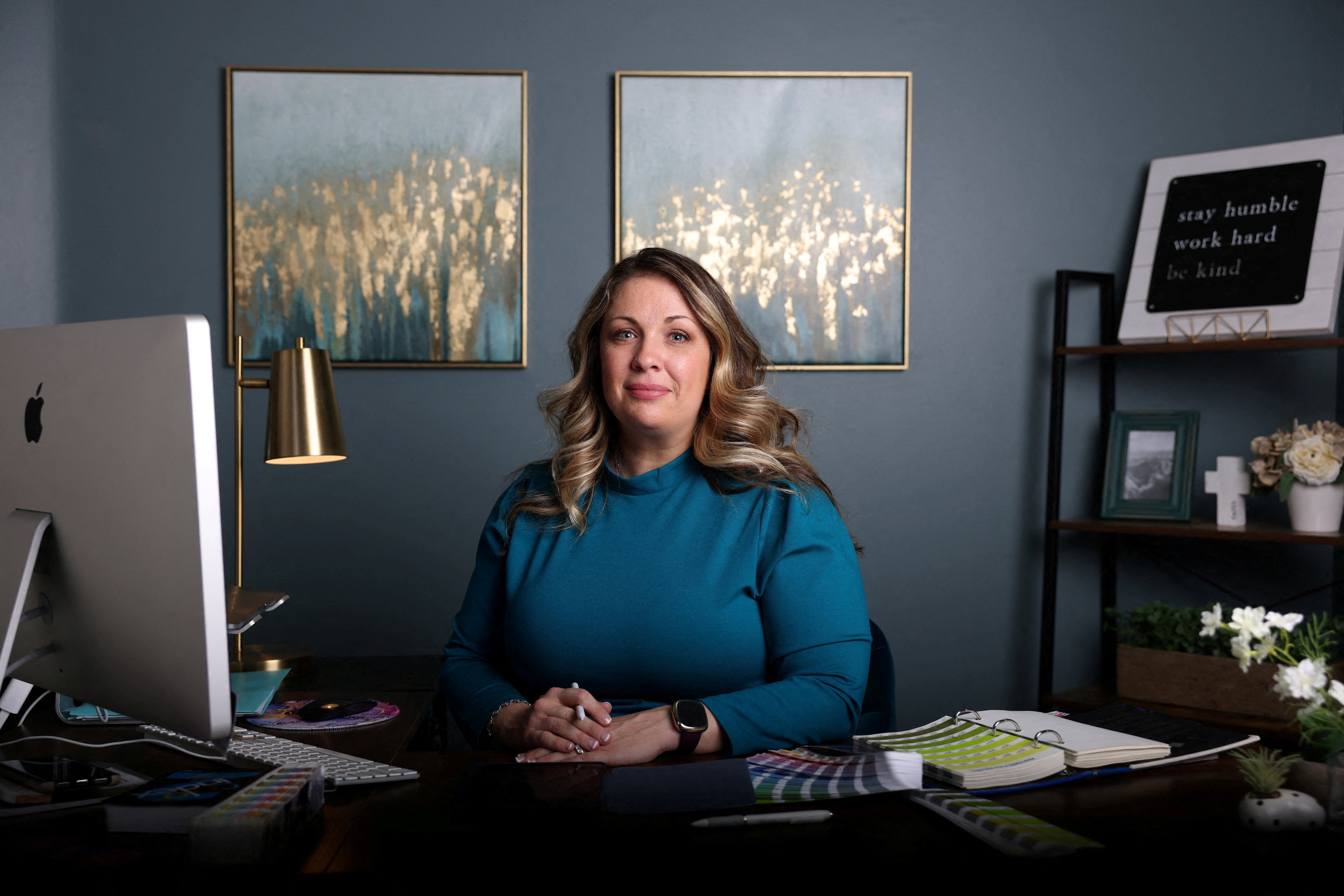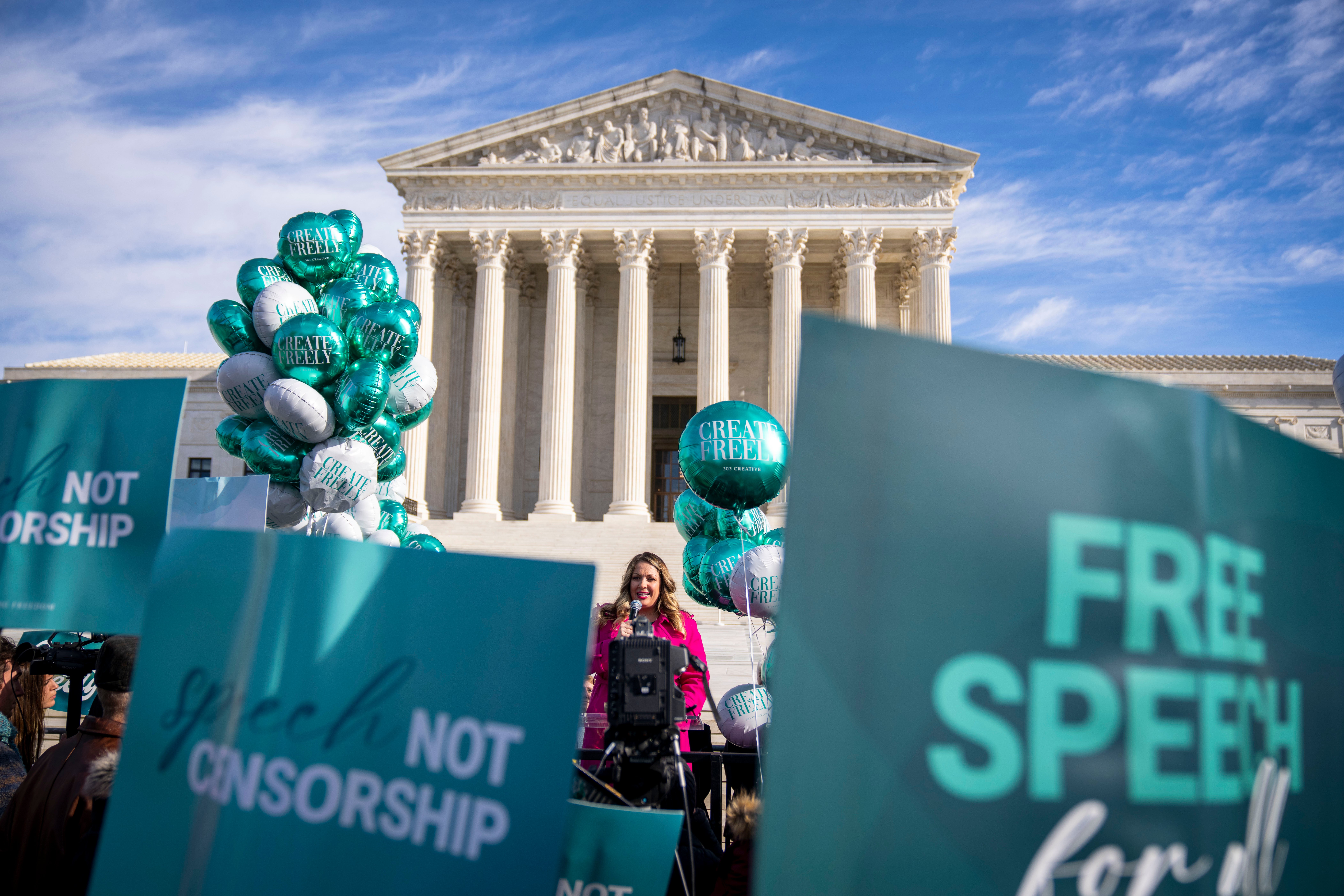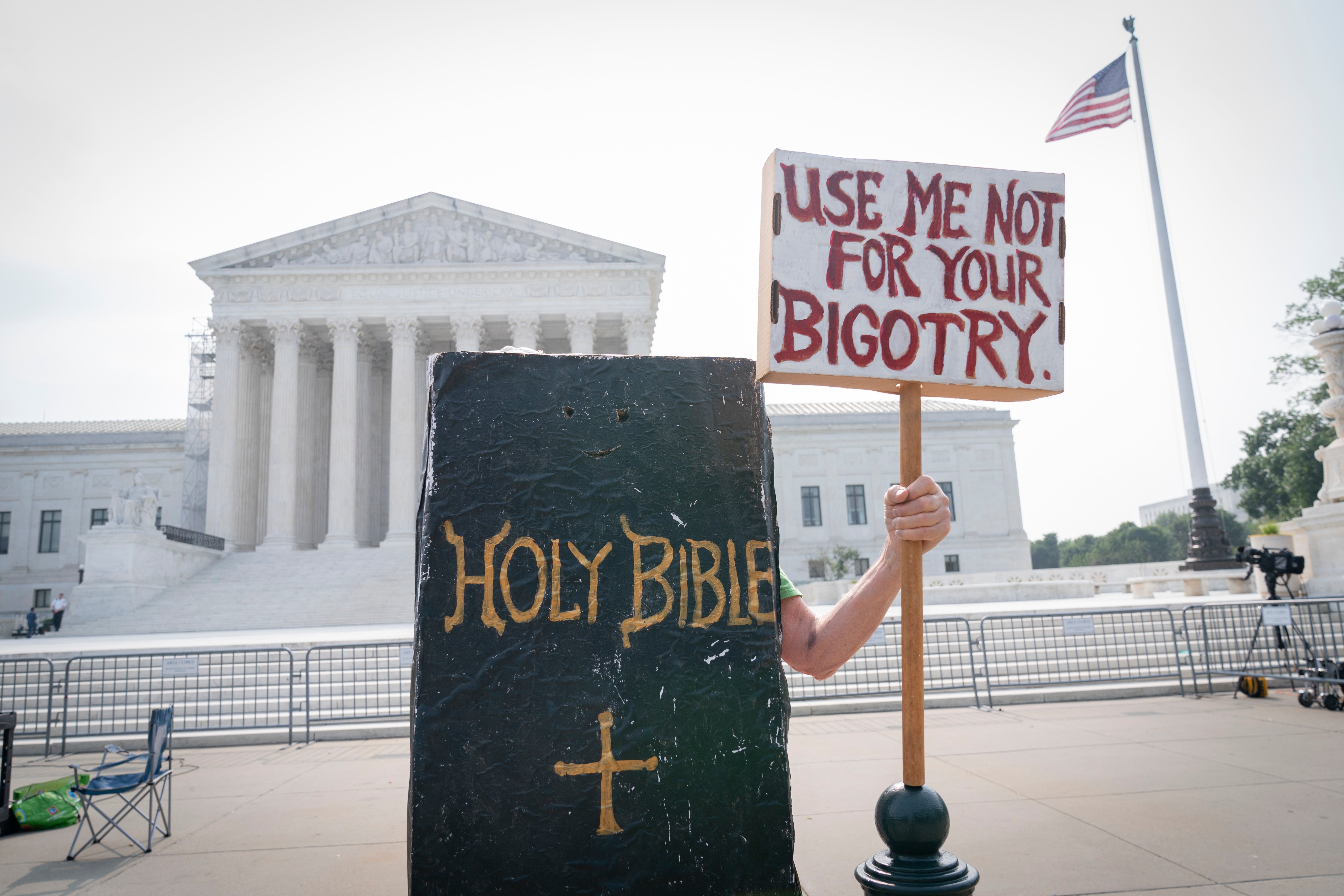Supreme Court allows Colorado designer to deny LGBT+ customers in ruling on last day of Pride Month
Supreme Court delievered final rulings of the term, opening door for artists to deny services to LGBT+ people
A wedding website designer may refuse to create work for people in the LGBT+ community if it conflicts with their religious beliefs, the Supreme Court ruled on Friday.
In a 6-3 decision, the conservative majority of the court ruled in favour of Lorie Smith, a Colorado-based website creator, who wanted to refuse service to same-sex couples but couldn’t as it was a violation of a public accommodation law.
The court argued that the public accommodation law in Colorado impedes Ms Smith’s First Amendment right to deny conveying messages she disagrees with.
“The First Amendment prohibits Colorado from forcing a website designer to create expressive designs speaking messages with which the designer disagrees,” Justice Neil Gorsuch wrote in the majority opinion.
Justice Gorsuch wrote that if the court forced Ms Smith to follow the public accommodation law, it would “allow the government to force all manner of artists, speechwriters, and others whose services involve speech to speak what they do not believe on pain of penalty.”
The case
303 Creative LLC v Elenis was unique in that it asked the justices to rule on a question that was solely based on a hypothetical scenario.
The case was brought forth by Lorie Smith, a Colorado-based website designer who claimed she wanted to expand her business to make wedding websites but would refuse to do so for same-sex couples because it went against her religious beliefs.
According to Ms Smith, a gay man named Stewart requested her services for help designing invites, placename cards and more for his upcoming wedding to a man named Mike.
A recent report from The New Republic claimed that Stewart, while a real person, did not send this inquiry and is happily married to a woman.
Ms Smith said she planned to put a statement on her website explaining why she could “only speak messages consistent with her faith” but it would violate the Colorado Anti-Discriminator Act (CADA) which prohibits businesses open to the public from discriminating against people due to their sexual orientation or gender identity.
She argued that this law would force her to convey messages that violated her religious beliefs by “celebrating” a same-sex marriage.

Representing Ms Smith was attorney and president of the Christian legal organisation Alliance Defending Freedom, Kristen Waggoner.
Ms Waggoner previously served as the lead counsel on Masterpiece Cakeshop v Colorado Civil Rights Commission (2018) a case that, similarly, concerned a Colorado cake shop that refused to make cakes for same-sex couples.
Most notably, Alliance Defending Freedom recently successfully helped overturn the landmark case Roe v Wade (1973) in the Supreme Court case Dobbs v Jackson Women’s Health Organization (2022).
The Mississippi law at the centre of Dobbs was based on Alliance Defending Freedom’s model legislation that was designed to provoke a legal challenge that could be appealed to the conservative Fifth Circut Court of Appeals then the Supreme Court.
Ms Smith and Alliance Defending Freedom’s argument in 303 Creative LLC v Eleni has been subject to criticism given the case was not based on real people or a lived situation.
Multiple articles covering the case called it as “fake” and criticised Alliance Defending Freedom for bringing the non-issue to the highest court in the land.
But Alliance Defending Freedom defends their argument. In a statement provided to The Independent, Kellie Fiedorek, senior counsel with Alliance Defending Freedom said: “Whether Lorie received a legitimate request or whether someone lied to her is irrelevant. No one should have to wait to be punished by the government to challenge an unjust law.”
Though the scenario the case is based on is hypothetical, Ms Fiedorek said that Ms Smith has received “other wedding requests” but has been unable to respond to them.
The opinion
The Court argues that ruling in favor of Ms Smith protects her First Amendment right to deny conveying messages she does not agree with.
“As this Court has long held, the opportunity to think for ourselves and to express those thoughts freely is among our most cherished liberties and part of what keeps our Republic strong,” Justice Gorsuch wrote in the majority opinion.

He added: “Of course, abiding the Constitution’s commitment to the freedom of speech means all of us will encounter ideas we consider ‘unattractive,’ ‘misguided, or even hurtful.’”
Chief Justice John Roberts and Justices Brett Kavanaugh, Clarence Thomas, Samuel Alito and Amy Coney Barrett concurred with Justice Gorsuch.
The dissent
In her dissenting opinion, Justice Sonia Sotomayor called the decision “profoundly wrong”, adding that “Our Constitution contains no right to refuse service to a disfavored group.”
“The business argues, and a majority of the Court agrees, that because the business offers services that are customized and expressive, the Free Speech Clause of the First Amendment shields the business from a generally applicable law that prohibits discrimination in the sale of publicly available goods and services,” Justice Sotomayor wrote.
“That is wrong. Profoundly wrong.”
Justices Ketanji Brown Jackson and Elena Kagen joined Justice Sotomayor’s dissent.

She added: “Today, the Court, for the first time in its history, grants a business open to the public a constitutional right to refuse to serve members of a protected class,” Justice Sotomayor wrote.
“I fear that the symbolic damage of the Court’s opinion is done.”
The ruling in 303 Creative LLC v Elenis opens the door for future cases to dispute the rights of LGBT+ people and same-sex couples on the grounds of religious freedom and the First Amendment.
Kelley Robinson, president of the Human Rights Campaign, issued a statement on the ruling, saying: “This decision by the Supreme Court is a dangerous step backward, giving some businesses the power to discriminate against people simply because of who we are. “
President Joe Biden said he was “Deeply concerned that the decision could invite more discrimination against LGBTQI+ Americans” in a statement.
“Today’s decision weakens long-standing laws that protect all Americans against discrimination in public accommodations – including people of color, people with disabilities, people of faith, and women,” Mr Biden said.
The President went on to “urge” Congres to pass the Equality Act to enshrine civil rights protections for the LGBT+ community.




Bookmark popover
Removed from bookmarks